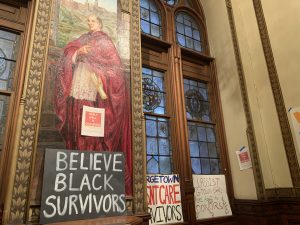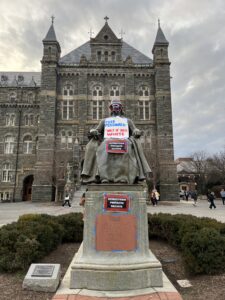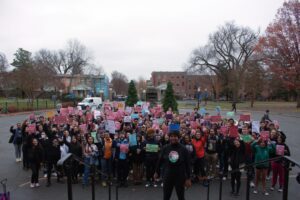Howard University students are no strangers to organizing for much-needed change; this month, the university’s inadequate handling of unsafe housing conditions has forced students to publicly protest for livable space.
For the last two weeks, Howard students have occupied the Armour J. Blackburn University Center, the social hub of campus, with a list of demands for structural fixes to the campus housing crisis. Students say the sit-in will continue until the university provides sufficient space for students currently experiencing homelessness and fixes existing structural problems; until the university permanently reinstates the affiliate positions of students, faculty, and administrators on the board of trustees; and until legal, disciplinary, and academic immunity is granted to all participants occupying Blackburn.
This isn’t the first time that administrators’ actions have forced students to protest to have their voices heard. In 1968, in response to years of Howard administrators announcing that the university was not “destined to be a Black university”, 1,000 students occupied Douglass Hall for five days demanding the president’s resignation, judicial reform, an emphasis on African-American history in the curriculum, and for the charges against 39 student activists to be dropped. In 2018, a nine-day sit-in ended with the university coordinating with students on a “Statement of Commitments,” which included creating a food bank and overhauling the school’s sexual assault policy.
The students’ current demands follow a similar basis as the older protests: access to basic resources and rights. “They’re needed demands, and they’re not hard demands,” one Harriet’s Wildest Dreams organizer and Bison parent said. Harriet’s Wildest Dreams is a Black-led abolitionist organization that focuses on defending Black lives against state-sanctioned violence in the D.C. area, and has been participating in the Blackburn sit-in with the students.
For months, students have raised concerns about mold, rats, and roaches in their living spaces, The sit-in started after administrators failed to attend a town hall the Howard University Student Administration (HUSA) hosted for students to voice their grievances about their Bison experience, despite every member of University President Wayne A. I. Frederick’s cabinet being invited.
One of the initial student demands was for Frederick and administrators to host a town hall by the end of October, a date that has come and gone without any action from the university.
“If you’re a Bison, everyone is your family, you’re supposed to support your family, you’re supposed to come out here and make sure they’re safe,” one Howard University student, who declined to share their name, said. “So the fact that some of us Bison are struggling—have mold, water damage, some are homeless, some don’t have enough money out here to eat—that is a problem that the university should address.”
The sit-in, which began on Oct. 12, has entered its third week. It was just Homecoming week, meaning thousands of alumni and parents came to campus for the annual celebrations, increasing the university’s incentive to end the sit-in that much faster. The protestors have faced several obstacles as they continue to vocally demand change. On the first night of the protest, students in Blackburn linked arms and refused to move despite a fire alarm that brought the threat of dispersion from firefighters.
On the second day, Vice President of Student Affairs Cynthia Evers sent an email informing the student body that those participating in the sit-in and failing to comply with several university policies could be subject to disciplinary action. Despite these threats, the number of students grew from the initial nine to just over 60, though many hesitate to reveal their name for fear of university repercussions.
The worry is not unfounded, as Howard has taken numerous steps to discourage its students and break up the demonstration. The second night, police officers told students the WiFi would be shut off. In response, protestors brought hotspots, food, and toiletries, preparing for the long haul. At 10 p.m., administrators turned off the air conditioning, but students were not deterred.
“Since we’re an HBCU, you should always come out and engage with the community and be supportive,” one Howard student said. “We just want to see change so the freshmen who come next year don’t have to experience a bad first semester like we are.”
Student protesters also met with Frederick on the second night, who agreed to share the housing plan with student leaders.
Student housing conditions are abysmal, according to a group of Howard students who spoke with the Voice nearly a week and a half after Frederick’s initial promise. Mold has caused bronchial issues for many, they report, which, amidst a pandemic, can raise concerns for students. “I might have COVID I was coughing so bad, and every time I’m in [my room] for a long time I still do cough,” one Howard student said.
Despite the university claiming to have deep-cleaned every room, another student added, in their experience, the mold rarely gets removed. “I said there’s mold in our AC; they came and cleaned our floors,” the student said. The mold had forced this student to sleep in the lounge of her dorm in the Harriet Tubman Quadrangle due to the mold conditions; she has been sleeping in a tent in front of Blackburn for the last day.
“They need to tear the whole dorm down,” another student said. “It’s internal.”
“A recent inspection discovered mold in less than a tenth of 1 percent of rooms – 34 out of 3,300. We encourage students to report service needs as soon as possible by contacting the front desk attendant, by phone or online,” a spokesperson for Corvias Property Management, Howard University’s housing partner, said in a statement to the Guardian.
The group of students pointed out that other schools often put students in hotels, even if temporarily, while structural problems are being addressed. Georgetown did this twice, once in 2015, while construction was being completed on Arrupe Hall, and again in 2019, when structural concerns about Alumni Square prompted the temporary relocation of approximately 85 students. At Howard, however, students who feel unsafe staying in their assigned housing have been forced to camp in front of Blackburn in tents due to the lack of university support.
The Tower Companies, a real estate company in Maryland, has offered their “dead spaces”—or unused apartments—to Howard students experiencing homelessness as a result of the university’s housing failures, according to two representatives who spoke with the Voice at the sit-in. The dozens of tents surrounding Blackburn housed students who say they had nowhere to go despite paying nearly $10,000 each year for room and board.
Another focal point of the sit-in is financial transparency. “Where is this money going and where are these donations going?” one student put it.
The university received $140 million in donations in 2021, breaking its fundraising record. Frederick’s salary exceeds one million dollars each year. “[The president] makes 90,000 a month, 2,100 dollars a week while students are living with mold, and I know in his house, he don’t got no mold,” one Howard student said.
One graduate student in the Master’s of Divinity and Social Work program noted other financial discrepancies at the university, including research assistant pay taking months after the start of work to be processed and law student teaching assistants who have yet to be paid after months of work.
The same student called the sit-in the most respectable action students can take. “This was the last resort,” they said. Despite the lack of violence at the sit-in, the university has told students participating in the sit-in to contact a lawyer or attorney if they expect to avoid consequences, the group of students said. Students are being threatened with their scholarships and leadership positions, while teachers who support the effort risk their jobs or salaries, according to the students.
“People out here are having breakdowns daily because they’re just so frustrated, and because they’re not getting legal or academic immunity,” one Howard student said. The mental health toll on these students, who are fighting for basic standards of living, cannot be understated. As the temperatures drop to the mid-30s at night, students continue to live in tents while administrators threaten academic and legal consequences to demands for basic living conditions. Protests, even when nonviolent, are associated with adverse mental health outcomes.
Howard’s Board of Trustees released a statement on Oct. 15 in which they reiterated their commitment to ensuring adequate on-campus housing conditions and offered the past elected student affiliate trustees the opportunity to serve a year-long term as full trustees, one of the conditions outlined by protestors.
In response, The Live Movement, an organization that works to help students form a national coalition to advocate for educational reforms and the advancement of Black education, released a statement decrying the false promises and lack of clarity in the boards’ solutions. “In their communications, there is no mention of holding open meetings to hear student grievances and concerns. They mention the need to fix the issues of the housing crisis and inadequate living conditions but provide no timeline for a safe and proper existence on campus,” the statement reads.“The students need to see action and an accurate agenda for progress instead of empty promises.”
Exactly two weeks after the sit-in began, Frederick sent an email to the Howard student body addressing the sit-in and calling for its immediate end, which sparked significant discontent among some members of the Bison community. Frederick argued that a “vast majority” of students are not experiencing the impacts of the housing crisis and expressed a willingness to continue substantive dialogue with the student organizers and their legal counsel only if students shut down the protests.
Frederick said in a letter to the Howard community that the student protestors are impeding “operations and access to essential services.”
”While there have only been a small number of documented facilities reports relative to our entire inventory of residence rooms, we are actively inquiring about unreported issues that may be in the residence halls by going door to door to interview and assist each resident,” Frederick wrote. “The results of our inquiries to date affirm that the issues are not widespread and the vast majority of our students are living comfortably in their rooms.”
The lack of progress has not diminished the students’ willingness to protest. The graduate student said this communications and infrastructure struggle is not unique to any one university, and that solidarity can amplify what is happening at Howard and create a foundation for other educational institutions. “As a student collective, be in community,” the graduate student said. Contacting lawmakers and policymakers could help resolve the issue of transparency and communication on a national scale, according to the student.
“Being able to be a student at Georgetown, you all actually are on the ground of where our Black ancestors are killed, so that’s more reason for a school like Georgetown to step up and be in solidarity and help Howard get their demands met,” the Harriet’s Wildest Dream and Bison parent said.
“The main thing we’re trying to do here is spread the word as far and as wide as we can across the nation,” Raegan Carter, the student communications person and social media manager for the sit-in, said. “That’s the number one goal here, because getting more attention to it gets more supporters, which gets our demands met.”
Support for the protestors has come from D.C. Freedom Fighters, whose mutual aid network cash app ($FFDC20) has helped raise funds and supplies for students. Gucci Mane’s 1017 artists refused to perform at Howard for a scheduled event and instead joined students at the sit-in. Local organizations like Harriet’s Wildest Dream D.C. and the Young Democratic Socialists of America have also collected aid and gone out to support students.
Carter asked that students from other D.C. universities repost information about the sit-in on social media and underscore the importance of The Live Movement. This comes amidst the Hilltop, Howard University’s student newspaper, being advised by the Student Press Law Center after allegations from Howard administrators of innaccuracy and bias
Georgetown students have been working to meet these goals. Joseph Ravago (COL ’23), the social engagement director for nomadictheatre, helped share a fundraising Bingo board made by Ashanee Kottage (SFS ’22), who shared it with a group of Residential Assistants. The Bingo board project has raised over $250 dollars as of Oct. 24, and Ravago has already used more than half of the money to purchase supplies for the protestors.
“The Live Movement posted on their Instagram about needing supplies, especially since they’re outside and it’s getting colder, so as a board we funded a little bit to buy supplies,” Ravago said. Other Georgetown organizations and students, like Rapid Ramen, have done the same, reposting Venmo accounts and cash apps to collect funds to send to the protestors.
GUSA Sen. Nirvana Khan (SFS ’24), who also went on a supply run to Howard during the second week of protest, noted the importance of the protests in creating structural changes for secondary education. “I feel like that’s a kind of solidarity and collective action you don’t usually see at Georgetown. I think we could learn a lot from Howard students,” she wrote in an email to the Voice.
“I would love to see more students joining in on supply runs and donating to The Live Movement directly,” Khan wrote.
Elijah, a community representative for the sit-in, emphasized that despite students’ limited time on a college campus, these demands are crucial to upholding the health and human rights codes the university abides by. “These four to seven years is history being made,” Elijah said.
“Hopefully, this is successful so other students can see that just because we’re a private university doesn’t mean we have to keep our matters private,” one Howard University student added.
Ravago spoke to the importance of Georgetown students stepping up to help the protestors. “Being able to use the privilege that we have at Georgetown—that’s very affluent, it’s a PWI— so there’s a lot of privilege here and being able to realize that you have that privilege and you can use it to affect other organizations and help Howard students I think is important,” he said.
Howard students, when asked what Georgetown and other university students can do to help support the protestors, overwhelmingly replied with one word: “Come.”






